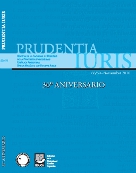Por favor, use este identificador para citar o enlazar este ítem:
https://repositorio.uca.edu.ar/handle/123456789/2693| Título: | El derecho natural y el nuevo paradigma del derecho | Autor: | Herrera, Daniel Alejandro | Palabras clave: | DERECHO NATURAL; DERECHO CONSTITUCIONAL; DERECHOS HUMANOS; MODERNIDAD; POSMODERNISMO; RELATIVISMO MORAL | Fecha de publicación: | 2010 | Editorial: | EDUCA Universidad Católica Argentina. Facultad de Derecho |
Cita: | Herrera, D. A. El derecho natural y el nuevo paradigma del derecho [en línea], Prudentia Iuris. 2010, 68-69. Disponible en: https://repositorio.uca.edu.ar/handle/123456789/2693 | Resumen: | Resumen: En las últimas décadas, mientras en el pensamiento mo - ral asistimos al panorama sobre las últimas consecuencias del relativismo, en el derecho se ha ido conformando un nuevo paradigma: el “Estado de derecho constitucional” cuyo fundamento se halla en la defensa de los derechos humanos y en el principio democrático en la organización social. Para poder comprender tal nuevo modelo sobre el derecho se hace necesario analizar previamente los fundamentos filosóficos en que se sustenta, caracterizados por la dialéctica modernidad- posmodernidad. La modernidad asentada en el desencantamiento del mundo, la descontextualización del saber y el subjetivismo; y la posmodernidad que le ha agregado la instrumentalización de la razón, el aumento del nominalismo lingüístico y un mero pragmatismo han generado el nacimiento de una “nueva ética” totalmente individualista y un neo-constitucionalismo que ha colocado a la Constitución, fundada en los derechos individuales y en la democratización de la vida pública, en el núcleo del pensamiento jurídico actual. Frente a tal panorama, se indican a modo de contribución académica, las ventajas y desventajas o peligros que tal modelo jurídico- político lleva implícito. Abstract: In the last decades, while in the moral thinking we attend the panorama on the last effects of the relativism, in law it has been conceived a new model: the “The State of Constitutional Law” whose foundation is the defense of the human rights and the democratic principle in the social organization. To be able to understand such a new model in law it is necessary to analyze the philosophical foundations in which is sustained, characterized by the dialectical modernity and post modernity. The modernity stated in the disillusionment of the world, the out- of-context of knowledge and the subjectivism; and the post modernity that has added the implementation of the reason, the increase of the linguistic no - minalism and a mere pragmatism has produced the birth of a “new ethics” completely individualistic and a new -constitutionalism that has placed the Constitution founded in individual rights and in the democratization of the public life, in the nucleus of the current juridical thinking. In face of such panorama, it is indicated as ways of academic contribution, the advantages and disadvantages or dangers that such a pattern implies. |
URI: | https://repositorio.uca.edu.ar/handle/123456789/2693 | Disciplina: | DERECHO | Derechos: | Acceso Abierto | Fuente: | Prudentia Iuris Nº 68/69, 2010 |
| Aparece en las colecciones: | PI - 2010 nro. 68-69 |
Ficheros en este ítem:
| Fichero | Descripción | Tamaño | Formato | |
|---|---|---|---|---|
| derecho-natural-nuevo-paradigma-herrera.pdf | 220,82 kB | Adobe PDF |  Visualizar/Abrir |
Visualizaciones de página(s)
1.036
comprobado en 07-ene-2026
Descarga(s)
504
comprobado en 07-ene-2026
Google ScholarTM
Ver en Google Scholar
Este ítem está sujeto a una Licencia Creative Commons

